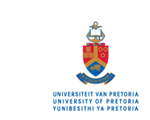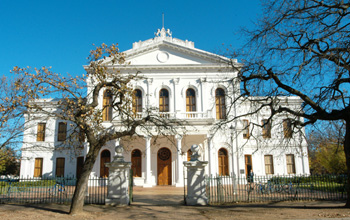
The Organisers of the Stellenbosch Annual Seminar on Constitutionalism in Africa (SASCA) are pleased to announce the call for papers for the Eighth Stellenbosch Annual Seminar on Constitutionalism in Africa (SASCA 2020) which will be held in Stellenbosch (South Africa) from Monday 21 September to Wednesday 23 September 2020. SASCA 2020 will be jointly organised by the Institute for International and Comparative Law in Africa (ICLA) of the Faculty of Law, University of Pretoria, the South African Research Chair in Multilevel Government, Law and Development (SARChI) at the Dullah Omar Institute, University of the Western Cape, and the Stellenbosch Institute for Advanced Study (STIAS).
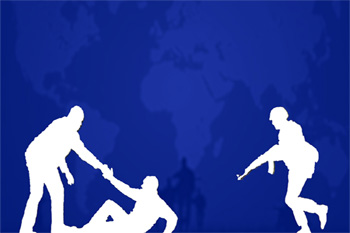
Pretoria, 28 January - 06 February 2020
The Pretoria Regional Delegation of the International Committee of the Red Cross together with the Institute for International and Comparative Law in Africa and the Centre for Human Rights of the University of Pretoria will be presenting the seventeenth All Africa Course on International Humanitarian Law between 28 January and 06 February 2020.
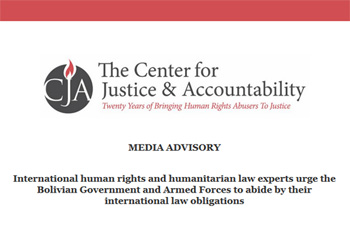
San Francisco, CA, and Cambridge, MA (November 26, 2019) -- Today, experts in international law urged the Bolivian Government to abide by its international legal obligations to protect the freedom of assembly and prohibit the excessive use of force against civilian protesters. In a statement signed by a former president and a former executive secretary of the Inter-American Commission, two former and the current UN Special Rapporteurs on Extrajudicial, Summary or Arbitrary Executions, two former UN Special Rapporteurs on Torture and Other Cruel, Inhuman and Degrading Conditions, as well as leading scholars in international law, the experts made clear what the Bolivian Government’s obligations are under international law.
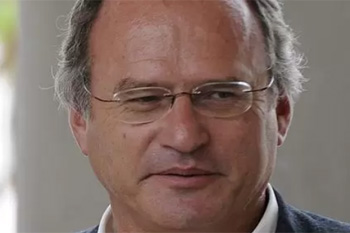
Original post: https://www.iol.co.za
Pretoria - The UN is in the process of developing a restatement of the legal rules on how demonstrations are to be handled. Prof Christof Heyns from the University of Pretoria’s law faculty, who is also a member of the UN Human Rights Committee, has been appointed to lead this process.
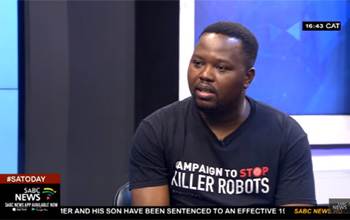
With the advent of the fourth industrial revolution, a plethora of technological innovations has changed the way we live and work. This innovation is also seeing new ways that wars will be fought. The soldiers won't be humans, but robots. A new generation of autonomous weapons or "killer robots" could dramatically change military drone technology. Joining us is Dr. Thompson Chengeta, a Human Rights Law expert to give us a perspective on why we should be concerned in Africa about these autonomous weapons
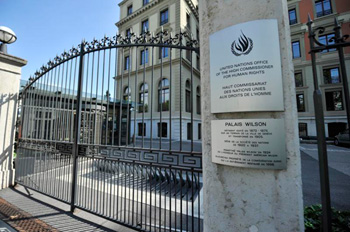
A number of Univeristy of Pretoria researchers have been arguing that the United Nations human rights system will be more effecitive - with more visibility and greater global ownership - if the bodies monitoring human rights compliance by states meet not only in Geneva, but also in other parts of the world when monitoring compliance. Samoa will now be the first country to implement this proposal, when they host the Committee on the Rights of the Child there next year. According to Prof Christof Heyns, a member of the UN Human Rights Committee, this will in particualr allow countries from the South to engage more directly and on a more eqaul footing with the system.
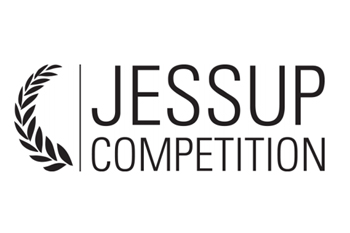
16 October 2019 - The President of the South African Law Deans’ Association, Professor Letlhokwa George Mpedi, recently announced a partnership with global law firm White & Case LLP to support students from law faculties throughout South Africa to participate in the Philip C. Jessup International Law Moot Court Competition (“Jessup”) for at least the next two years.
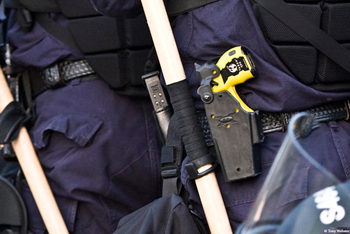
You are cordially invited by the Office of the United Nations (UN) High Commissioner for Human Rights (OHCHR), in collaboration with the Geneva Academy of International Humanitarian Law and Human Rights, the Centre for Human Rights (University of Pretoria) and the Permanent Mission of Switzerland to the UN in Geneva to the launch of the United Nations Human Rights Guidance on Less Lethal Weapons and Related Equipment in Law Enforcement.
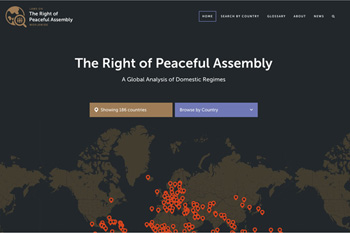
ICLA and the Centre for Human Rights are delighted to announce the launch of their new global online repository of laws on the right of peaceful assembly.
Laws on the Right of Peaceful Assembly Worldwide, at www.rightofassembly.info, contains legislation and regulations on the conduct and policing of assemblies in all 197 states recognised by the United Nations.
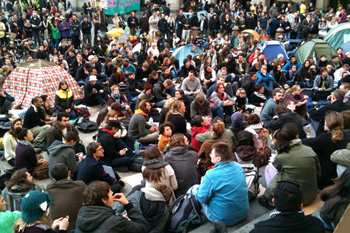
The Institute for International and Comparative Law in Africa (ICLA), University of Pretoria, in collaboration with the Law Faculty, University of Cape Town cordially invite you to a discussion by Prof Christof Heyns to be held on managing public assemblies.
Date: Friday 27 September
Time: 13:00 - 14-00
Venue: Staff Common Room Kramer Law Building, University of Cape Town
RSVP: This email address is being protected from spambots. You need JavaScript enabled to view it.
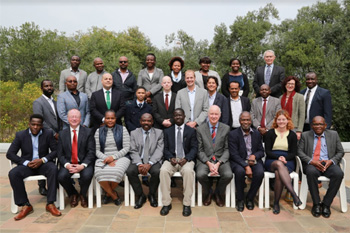
Constitutionalism and the economy in Africa 18-20 September 2019
Summary report
The Seventh Stellenbosch Annual Seminar on Constitutionalism in Africa (SASCA) 2019, jointly organised by the Institute for International and Comparative Law in Africa (ICLA) of the Faculty of Law, University of Pretoria and the Stellenbosch Institute for Advanced Study (STIAS) in partnership with the South African Research Chair (SARChI) on Multilevel Government, Law and Policy at Dullah Omar Institute, University of the Western Cape, and the Konrad Adenauer Stiftung Rule of Law Programme for Sub-Saharan Africa, based in Kenya took place in Stellenbosch from 18-20 September 2019. The theme for the seminar was; Constitutionalism and the Economy in Africa.
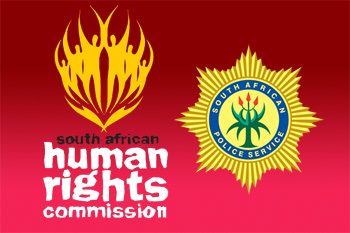
Date: Monday, 30 September 2019
Time: 14h00 - 16h00 (arrival and registration from 13h00)
Venue: Conference Room 2, Future Africa, University of Pretoria
RSVP: 26 September to Sibongiseni Tula (This email address is being protected from spambots. You need JavaScript enabled to view it.), copying Thandiwe Matthews (This email address is being protected from spambots. You need JavaScript enabled to view it.) and Kwanele Pakati (This email address is being protected from spambots. You need JavaScript enabled to view it.)
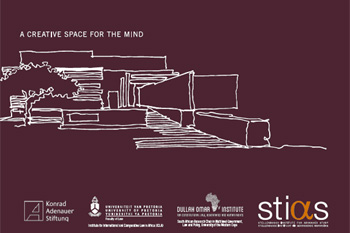
13 Sept 2019
You are cordially invited to attend two public lectures at STIAS organised as part of the Seventh Stellenbosch Annual Seminar on Constitutionalism in Africa, (SASCA 2019), 18-20 September 2019.
Former South African Minister of Finance, Mr Trevor Manuel will make the keynote address on Wednesday 18 September from 10h00 to 11h00.

The Seventh Stellenbosch Annual Seminar on Constitutionalism in Africa (SASCA 2019) will be held in Stellenbosch (South Africa) from Wednesday 18 September to Friday 20 September 2019. As in the past, SASCA 2019 will be jointly organised by the Institute for International and Comparative Law in Africa (ICLA) of the Faculty of Law, University of Pretoria, and the Stellenbosch Institute for Advanced Study (STIAS) in partnership with the South African Research Chair in Multilevel Government, Law and Policy (SARChI) at the Dullah Omar Institute, University of the Western Cape and the Konrad Adenauer Stiftung Rule of Law Program for Sub-Saharan Africa.
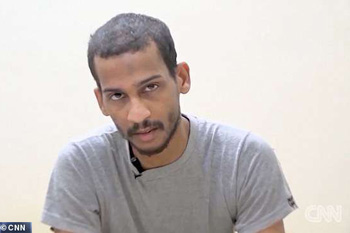
In the last few days of its sitting before the summer recess the UK Supreme Court heard arguments in the matter of Maha el Gizouli v. Secretary of State for the Home Department. This case was appealed from the High Court, where a judge had earlier ruled the Home Secretary had acted lawfully in passing communications intelligence gathered by the United Kingdom to prosecutors in the United States in order to facilitate their case against Mr El Shafee Elsheikh (known as "Jihadi George", one of the Islamic State terrorist cell called the “Beatles”).
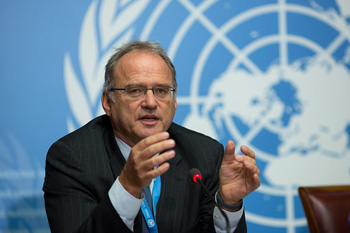
Perspectives of peaceful assembly Presented by Prof Christof Heyns
Public demonstrations emerged during the 20th Century as a powerful and popular form of political participation and mobilisation. It is a tool which has often been used in the pursuit of freedom, but it has also been used for many other causes. It has in some cases resulted in violence being used by the state, or by participants, or both. The recent events in places such as Hong Kong, Paris and Harare - and, closer to home, on our campus - present the question: How should states respond to peaceful (and not so peaceful) assemblies?
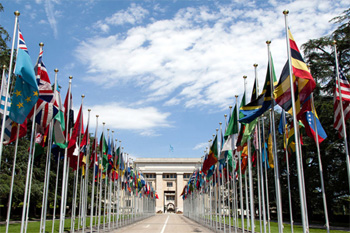
20 August
The Faculty of Law is currently in the unique position where a number of its professors serve as part-time expert members of United Nations bodies involved in the development of international law.
Two of them will discuss their work and how the appointment procedure works.
This should be of special interest to students who consider a career with an international dimension.
Date: 4 September 2019 | 12:30 – 13:30
Venue: Under the umbrella at the Institute for International and Comparative Law in Africa
A light lunch will be served | RSVP: This email address is being protected from spambots. You need JavaScript enabled to view it.
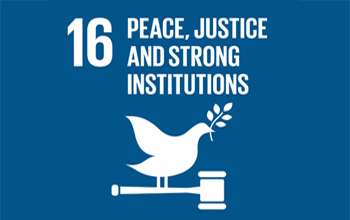
8 August 2019
South Africa is in the process of completing its first National Report within the framework of the Sustainable Development Goals (SDGs), in addition to presenting its Voluntary National Review at the UN High Level Political Forum in New York in July. The University of Pretoria has over the past six months been working with Stats SA to contribute to South Africa’s reports.

The University of Pretoria, working with a global network of research partners (including in Cambridge, Geneva and well-established collaboration with more than a dozen other African universities), recently established a research programme that focuses on violence reduction and securing the right to life in Africa. This is a multi-disciplinary programme that engages in the African context with the aspiration of UN Sustainable Development Goal 16 to establish ‘peaceful societies’.

10 June 2019
The Centre for Human Rights, University of Pretoria hosted a public lecture by Clement Voule, UN Special Rapporteur on the rights of peaceful assembly and association, and Christof Heyns, member of the UN Human Rights Committee on 4 June 2019.
Mr Voule spoke about his upcoming report to the UN Human Rights Council, on assemblies in the digital age. Prof Heyns spoke about General Comment 37 of the Human Rights Committee on the right of peaceful assembly.
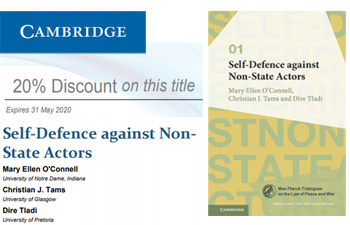
17 May 2019
In this book, self-defence against non-state actors is examined by three scholars whose geographical, professional, theoretical, and methodological backgrounds and outlooks differ greatly. Their trialogue is framed by an introduction and a conclusion by the series editors. The novel scholarly format accommodates the pluralism and value changes of the current era, a shifting world order and the rise in nationalism and populism.
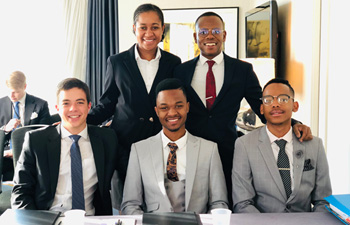
15 May 2019
In April 2019, the University of Pretoria’s Jessup Team represented South Africa at the International Rounds of the Phillip C Jessup Moot Court Competition in Washington DC. The team had won the South African National Rounds held in Johannesburg in February, where they were declared the ‘Overall Winner’ and thereby earned the right to represent South Africa at the International Rounds. More than 700 Law Faculties competed in the 2019 Jessup Competition across the globe
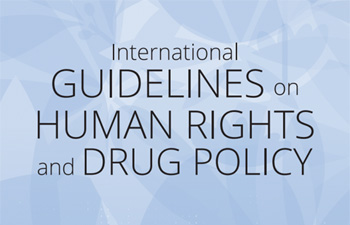
 Download guidelines
Download guidelines
Drug control intersects with much of the 2030 Agenda for Sustainable Development and the UN Member State pledge to leave no one behind. In line with the 2030 Agenda, the UNDP Strategic Plan 2018-2021 and the HIV, Health and Development Strategy 2016-2021: Connecting the Dots, the International Guidelines on Human Rights and Drug Policy provide a comprehensive set of international legal standards for placing human dignity and sustainable development at the centre of Member State responses to illicit drug economies.
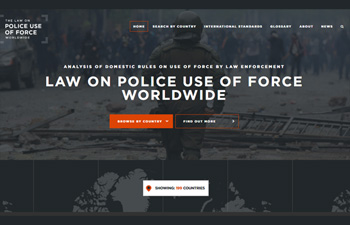
The Centre for Human Rights website covering domestic laws on the use of force by law enforcement officials worldwide (https://www.policinglaw.info) now covers the laws of 200 countries worldwide.
The website was started last year, under the supervision of Prof Stuart Maslen. Prof Maslen, who specialises in international law and in particular on the use of force, worked on his own and with students of the Centre, as well as with a clinical group at Oxford University and experts and students at universities in India and Switzerland, to gather the laws from these countries and to do an evaluation of how they measure up to international norms.
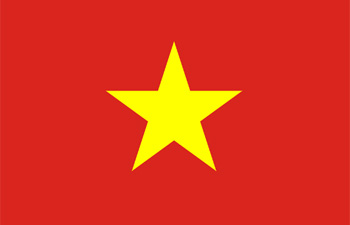
Original post: The New York Times
28 March
GENEVA — A U.N. human rights watchdog called on Vietnam on Thursday to stop imprisoning activists and journalists for criticizing state policies and voiced concern at a "high number of death sentences and executions" imposed for lesser crimes after flawed trials.
The U.N. Human Rights Committee reviewed Vietnam's record on upholding civil and political freedoms, marking the first time Hanoi has engaged with the independent experts since 2002.
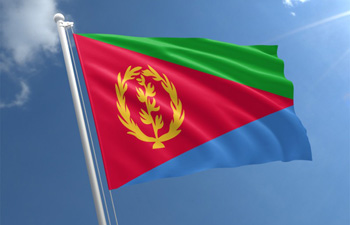
Original post: The New York Times
28 March
GENEVA — Eritrea must investigate allegations of extrajudicial killings by its security forces and resolve the fate of dozens of missing detainees, including a former finance minister, a United Nations human rights watchdog said on Thursday.
Military conscripts should not be to subjected to forced labor in mining or construction "while receiving no or very little salary" during indefinite national service, it said.
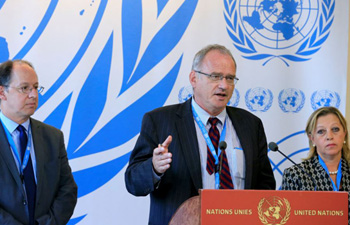
U.N. Independent Investigation on Burundi independent experts, from left, Pablo de Greiff, Christof Heyns and Maya Sahli-Fadel, talk to the media after presenting a final report to the Human Rights Council in Geneva, Sept. 27, 2016.
28 March
GENEVA — U.N. Human Rights experts are calling on the government of Eritrea to clarify the fate of dozens of disappeared people whose whereabouts have remained unknown since 2001.
Eritrea is one of seven countries examined by the Human Rights Committee, which monitors the implementation of the International Covenant on Civil and Political Rights.
The 18 independent experts of the Human Rights Committee have many concerns about the prevailing situation in Eritrea.
UN HRCtte hears half-day of contributions on a new general comment on the right of peaceful assembly
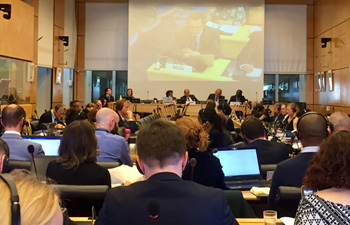
28 March
On 20 March the UN Human Rights Committee (HRCtte) dedicated a half-day of their current 125th session to hearing from civil society and expert stakeholders who had made written contributions concerning their next general comment, which will be on the right to peaceful assembly.
The HRCtte is one of the UN’s “treaty bodies”, and overseas the implementation of the International Covenant on Civil and Political Rights (ICCPR). In addition to receiving state reports and individual petitions, the treaty bodies also periodically adopt “General Comments” which are designed to condense their jurisprudence and provide interpretive guidance on their respective treaties. The HRCtte’s most recent general comment was No.36 on the right to life (Art.6).
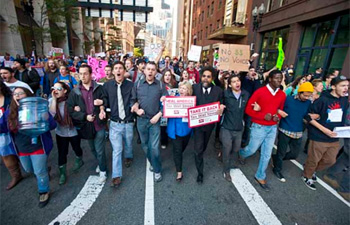
 Original post
Original post
Welcoming remarks by Christof Heyns
GENEVA (20 March 2019) - The Human Rights Committee this morning held a half-day general comments discussion in preparation for a general comment on article 21 of the International Covenant on Civil and Political Rights on the right of peaceful assembly.
Introducing the general comment, Christof Heyns, Committee Expert and Rapporteur for the general comment N°37, said that protest action was a defining part of the modern era and that allowing a platform for peaceful protest within a sensible framework was an integral part of the quest for a more peaceful world. The drafting process offered a singular opportunity to develop a coherent framework on which to base the future jurisprudence and to examine how new developments in the world impacted this right. Clearly, he said, assemblies were a “different animal” in the world of instant communications, surveillance, many more forms of non-lethal weapons, and the increasing use of drones in policing actions. Based on the written submissions received so far and today’s discussion, the Committee would develop the first draft of the general comment, which would be publicly discussed in July 2019, while the final version was expected by end of 2020.
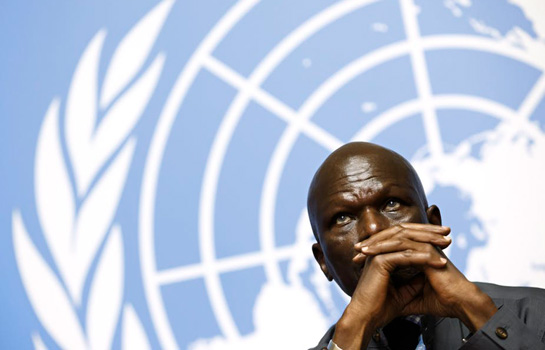
13 March
Author: Christof Heyns
After 23 years, the UN Human Rights Office in Burundi has closed – at the insistence of the country’s government. The Conversation Africa’s Moina Spooner spoke to Professor Christof Heyns, who was Chair of the United Nations Independent Investigation on Burundi, about the closure, why it happened and what this means for the country.
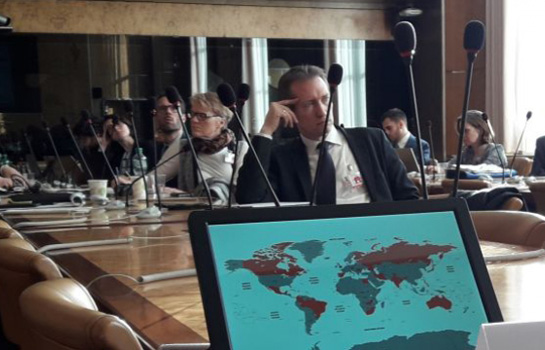
13 March
On 18 February 2019, researchers from 20 countries briefed state representatives about their research on the national impact of the United Nations (UN) treaty bodies (TBs).
This study, led by Professors Christof Heyns and Frans Viljoen at the Human Rights Center of the University of Pretoria and in collaboration with the Office of the UN High Commissioner for Human Rights, examines the impact of the UN human rights treaty system at the national level. Researchers based in 20 countries investigate the extent to which the work of UN TBs has had an impact on their country’s constitution, legal system and policies. Results will be presented by the end of 2019.
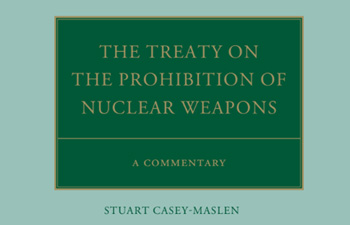
This is a legal commentary on the most recent global disarmament law treaty. Born out of deep concern about the humanitarian consequences of any use of nuclear weapons and a frustration at the refusal of nuclear-armed powers to countenance nuclear disarmament, the 2017 Treaty on the Prohibition of Nuclear Weapons is an important addition to the corpus of international law. The commentary includes an introduction to nuclear weapons and the international legal framework prior to the treaty's adoption at the United Nations. It then analyses the treaty itself article by article, looking at issues of state responsibility and attribution, jurisdiction, and compatibility with membership of military alliances.
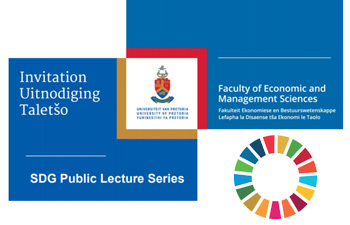
The South African SDG Hub at the Albert Luthuli Centre for Responsible Leadership cordially invite you to an SDG Public Lecture on SDG 16 delivered by Professor Christof Heyns
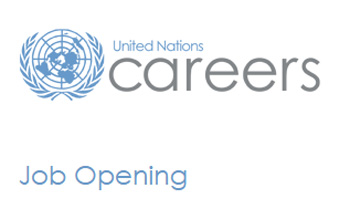
Posting Title:Internship-Human Rights (Regional), I (Temporary Job Opening)
Job Code Title: INTERN - HUMAN RIGHTS
Department/Office: Office of the High Commissioner for Human Rights
Duty Station: BANGKOK
Posting Period: 13 January 2019 - 31 December 2019
Job Opening Number: 19-Human Rights Affairs-OHCHR-110034-J-Bangkok (A)
Staffing Exercise: N/A
United Nations Core Values: Integrity, Professionalism, Respect for Diversity
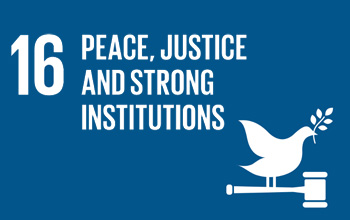
3 January 2019
The researchers who form the Freedom from Violence initiative at ICLA will be involved over the coming months in drafting the text of South Africa’s National Report on the Sustainable Development Goals (SDGR) with respect to SDG-16, the goal aimed at promoting peaceful and inclusive societies, providing access to justice for all, and building effective, accountable and inclusive institutions at all levels.
